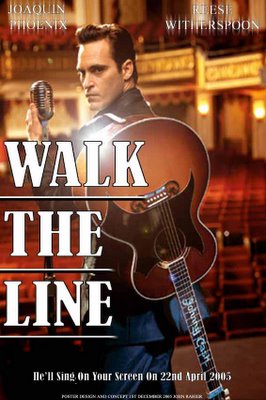
Walk the Line
Subtle. That’s why this movie works so incredibly well and it’s also why the writers and directors should be praised.
Walk the Line is the biopic that should be used as a yardstick for all other biopics. This movie is what you get when ambitious, thinking writers get a hold of a mans life. They had plenty of chances to take the lazy writers way out, lots of opportunities to think the audience incapable of grasping a subtle and dynamic character.
It would, for instance, have been so easy to make Cash’s father a completely evil and exaggerated abusive drunk. This could have been the lazy convention for explaining the problems Cash created for himself in his youth—it would be the simple A plus B connection some writers use. Instead they chose to make his father mean, certainly, but also kind of confused. He had moments of redemption in the film and on occasion I got the feeling that he would hear himself speak and be shocked at the venom coming from his own mouth. He wanted to stop but his temper and general anger at his lousy life wouldn’t allow him to stop the cruelty.
The elder Cash as played by Robert Patrick could easily have been the most vile and violent character you could imagine. Sure, he was detached from Johnny Cash’s life, played a role in the younger man blaming himself for his brothers death and in general made him feel worthless. All cruel acts but not necessarily indicative of a cruel man. A man shaped by generations of mean spirited people or drunks perhaps? We don’t know for sure but I certainly got the feeling that Patrick was trying to tell us his character was raised in that vein, that he was struggling a little to break that cycle and that he understood the evil inherent to it.
Likewise Cash’s first wife could have been a miserable, nagging shrew. It would have made the audience connect faster with Cash, could have excused even more of his behavior and perpetuated this sort of martyr image he had. It would have been lazy and trite but it’s usually effective. But not in this film. In this film we are allowed to empathize with Vivian Cash, we are allowed to understand that she’s left alone for huge stretches of time with all of the kids, we are shown that Vivian was there when Cash was flat broke, she was there to enjoy the dream starting and to support her husband. She had a dream of family life and raising children together and of enjoying Cash’s success with him. Instead she received a husband that never home and was thoroughly distracted when he was. A man that fell in love with another and rather than stay discrete he rubbed her nose in it.
No, Vivian Cash was not the villain and she was not the unbearable wife that drove Cash into the arms of another woman. She was pretty clearly the victim of both bad choices, impetuous decisions stemming from youth, and of Cash himself. It was ambitious of the writers, Gill Dennis and James Mangold, to choose to let us see who Cash really was. To make us understand that yes, he was a product of his poor upbringing, cruel father and some tragic events, but not entirely. Some of the mess was his, some of the cruelty was his and blaming all of his poor behavior on external factors was not accurate. Yet still, we liked him. Lesser writers and a lesser actor than Joaquin Phoenix could have made Cash a disagreeable sort, a despicable character or just plain pathetic—especially with the writers decision to allow us a complete look at his life.
This movie appears to be the first significant writing credit for Gill Dennis and what a masterpiece he coauthored here. His writing partner, however, has a pretty impressive scrap book. James Mangold’s writing credits include Kate and Leopold, Identity, the screenplay adaptation of Girl Interrupted and the underrated Cop Land. Mangold, incidentally, also directed this film and all of the films I just mentioned. He is clearly an immense talent and if you’re going to keep an eye out for a specific writers work, this would be the one.
I hear a lot of praise for Reese Witherspoon and all of it is justified. But the movie works because of the amazing talent found in the supporting cast and the writers decision to give them a little more complexity than we usually see. This film works because Ginnifer Goodwin is amazing as Vivian Cash, Robert Patrick is mesmorizing as the father and Shelby Lynne is understated and a presence as his mother.
Witherspoon and Phoenix were amazing, no doubt, but this is one of those rare movies where a ton of amazing talent met some brave artistic decisions and the result was one of the best biopics ever. It’s such a rare thing for all of that to happen in one movie and I hope people can truly appreciate this movie for what it is—a tremendous achievement and an amazing work of art. Here’s hoping the Academy, when they’re done fawning over the complex Gay Cowboy plot, is able to recognize this masterpiece. And I hope Witherspoon is recognized for her role. I think Phoenix outdid Crowe this time and deserves to win Best Actor. It should definitely be one of those two.
No comments:
Post a Comment